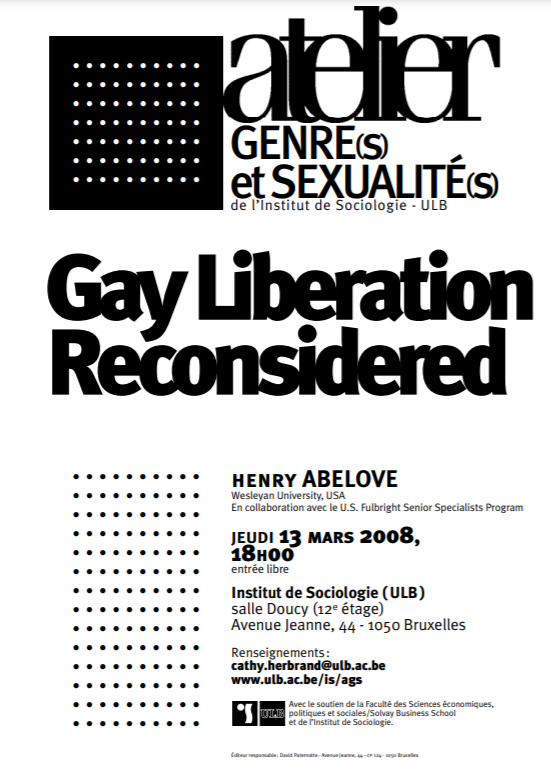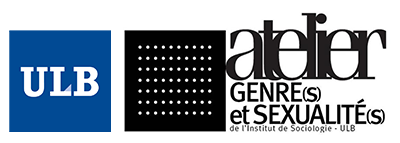Dans la même rubrique
13 mars
En collaboration avec le U.S. Fulbright Senior Specialists Program
Henry Abelove
(Wesleyan University)

Résumé
Much of the historiography on the beginnings of Gay Liberation in the USA focuses on the Stonewall Riot of 1969. This focus is misleading and reductive. It tends to produce a diminished view of Gay Liberation, as concerned with little more than ‘fighting back’ and ‘coming out.’ But Gay Liberation, in its first years in the USA -- say, from the sixties to the mid-seventies – was a social movement that quickly became above all an intellectual and cultural force. It generated and nourished new ideas, including new political ideas, and new values and new art. My purpose in this paper is to draw attention, at least in a preliminary way, to some of what was new and significant culturally and intellectually in early Gay Liberation in the USA. I will concentrate on the liberationalists’ understanding of the nation-state, of the concept of freedom, of colonialism, and of the institution of the family.
Bio/Bibliographie
Henry Abelove was educated at Harvard College and at Yale University, where he took his PhD in 1978. He has taught History at Yale University, Wesleyan University, Brown University, and Trinity College; English literature, at Wesleyan University, the University of Alberta, and Princeton University; and American Studies, at New York University and Trinity College. He presently serves as Willbur Fisk Osborne Professor of English Literature at Wesleyan University.
Abelove has authored two books – The Evangelist of Desire: John Wesley and the Methodists (Stanford University Press, 1990) and Deep Gossip (University of Minnesota Press, 2003) – and he has co-edited two others – Visions of History (Pantheon, 1983) and The Lesbian and Gay Studies Reader (Routledge, 1993). He has published articles and essays in various journals, including The Yale Journal of Criticism, The Huntington Library Quarterly, Dissent, The Radical History Review, The William and Mary Quarterly, and The Harvard Theological Review. He has given invited public lectures at more than thirty colleges and universities, and he has presented papers at many scholarly conferences. He has served on the editorial board of the Wesleyan University Press and of three journals -- Eighteenth-Century Studies, Genders, and The Journal of Homosexuality. He has also served as Chair of the Committee on Lesbian and Gay History, an affiliate of the American Historical Association. He has been a Visiting Fellow at the Center for European Studies at Harvard University, the John Carter Brown Library, the Humanities Center of the University of Utah, and the Humanities Research Centre of the Australian National University.
Abelove has won Wesleyan University’s Award for Excellence in Teaching, and he has also been appointed to the Stanley Kelly, Jr. Visiting Professorship for Distinguished Teaching at Princeton University. He focuses his teaching on eighteenth-century English literature and culture, the American transcendentalists, and queer theory.
Abelove is now at work on a book – contracted to Stanford University Press – on the philosopher George Berkeley and colonialism. He also is planning a book on gay liberation and its cultural expressions.
Documents à télécharger
- Abelove-03-08.pdf PDF, 93 Ko
